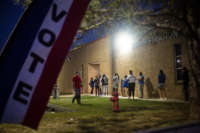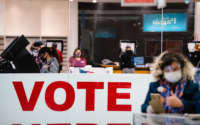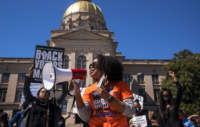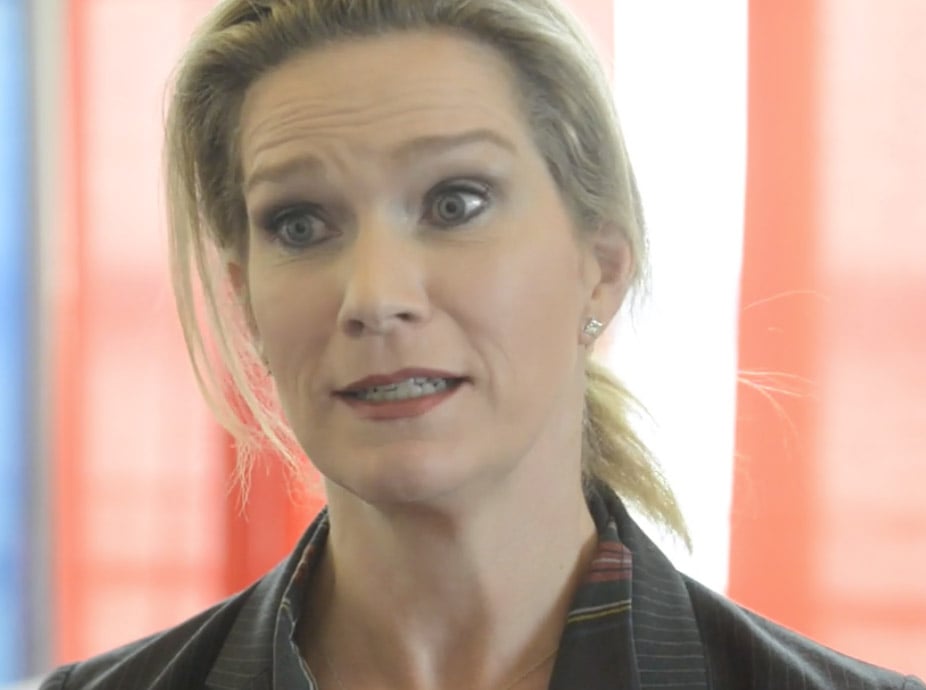
Republicans are waging a nationwide attack on voting rights and the right to protest. Kelly Hayes compares these efforts with the laws and conventions that ushered in the Jim Crow era, and talks with voting rights organizer Toni Watkins about how targeted communities are fighting back.
TRANSCRIPT
Note: This a rush transcript and has been lightly edited for clarity. Copy may not be in its final form.
Music by Son Monarcas
Kelly Hayes: Welcome to “Movement Memos,” a Truthout podcast about things you should know if you want to change the world. I’m your host, Kelly Hayes.
Since the beginning of the year, Republicans in 47 states have introduced at least 361 bills that would make it harder to vote. Five restrictive bills have already been signed into law and 29 others have passed at least one legislative chamber. These laws are part of a Republican long game to ensure white dominance in the U.S., but they have also been fueled by popular myths about a stolen election, and by a bitter backlash against the accomplishments of Black and brown organizers who scored historic victories in the 2020 elections. One of those organizers is today’s guest, Toni Watkins. Toni is an organizer with the New Georgia Project. She’s also an author, producer, political strategist, and much more. Toni Watkins, welcome to the show.
Toni Watkins: Thank you. I’m so excited to be here.
KH: How are you doing today?
TW: Doing well. It is a beautiful day in Georgia, so it’s awesome.
KH: Well, I am so glad you could be here today, because the assault on voting rights in the U.S. Is nothing short of horrifying, and I know we all have so much to learn from the work that your community has been doing. As a jumping off point, can you tell our listeners, who may not be familiar with the New Georgia Project, what kind of work you all do?
TW: Yeah, definitely. So the New Georgia Project, I will probably refer to it after this as NGP, is a 501(C)(3). We have a (C)(4) side, that’s the New Georgia Project Action Fund, but NGP is all about voter engagement and mobilization, so we work really, really hard to educate voters, inform voters, and help bridge gaps that people may have in casting their votes.
KH: I do want to take a moment to give people just a bit of historical grounding here. Because to a lot of people, the sweeping attacks on voting rights that we’re seeing may feel new or sudden because the media has done a terrible job of covering what Republicans have been up to over the last decade, and our educational system has done a terrible job of breaking down what white people have been up to over the course of this country’s entire history.
I was fortunate enough to attend a teach-in recently called Voting Rights Under Attack!, hosted by The Frontline, where you were actually a panelist, and Pam Spees, an attorney at The Center for Constitutional Rights, offered some important historical framing that I would like to share with our listeners. Pam explained that we can see parallels to what we’re experiencing now to over a hundred years ago when panicked white men held the Louisiana Constitutional Convention of 1898, which was basically one of many conventions and meetings of its kind across the South, where some of the architects of Jim Crow were drawing up blueprints for a system of exclusion that would disenfranchise as many Black voters as possible.
That system of exclusion, violence, and intimidation included poll taxes and literacy tests, various forms of criminalization and other tactics that were of course, accompanied by acts of lynching and other heinous forms of violence. And the success of those measures was overwhelming. In 1888, there were 127,923 Black voters and 126,884 white voters in the state of Louisiana. By 1904, there were 1,342 registered Black voters remaining in the state. In Alabama in 1900, there were 180,000 registered Black voters, but only 3000 by 1903. And in Mississippi in 1955, 10 years before the passage of the Voting Rights Act, only 4.3% of Black people were registered to vote. So we are talking about an incredibly successful political project designed by white men, who much like their contemporary counterparts, recognized that their situation was changing and that they could not maintain white dominance of the political system through free and fair elections.
In 1965, the Voting Rights Act passed and within the first year of its passage, we saw 250,000 Black people registered to vote. According to the U.S. Census Bureau, Black voter turnout has increased incrementally in every presidential election since 1996. In 2012, Black voters showed up at higher rates than white voters. Then in 2013, the Supreme court gutted the Voting Rights Act and immediately we saw a deluge of voter ID laws, poll closures, gerrymandering, and other attacks on the Black vote, including various forms of intimidation. On this show, we have covered a number of the attacks on voting rights that we saw under the Trump administration, including efforts to sabotage the postal system to derail mail-in voting. And we did some episodes on what you all were up against in Georgia specifically.
I know you all had a very sophisticated voter suppression apparatus working against you as you were registering people to vote and working turnout, but as everyone knows, you made history and defeated that apparatus. But now we’re seeing the backlash and the hastening momentum of what some are calling Jim Crow 2.0. Can you tell us about the passage of SB 202 and how it amplifies what you all were already up against in Georgia?
TW: Yeah, so Senate Bill 202 is a direct attack, excuse me, in consequence of our success in electing progressive representation in Georgia. So it’s really, really clear to us that voter suppressionists are working to punish Black and brown voters, we’re not voting them into office. Senate Bill 202 is full of things that historically Republicans have enjoyed: Saturday and Sunday voting, early voting. These are things that they created legislation for and passed into law under their majorities. So now that the population of Georgia is shifting, which I will reference a little bit later when I talk about our name, The New Georgia Project, but now that we’re shifting into a majority that is comprised of Black, brown, queer, young people, they want to change the rules because we have figured out how to win the game that they have tried to stack against us.
So what we see is them trying to eliminate Sunday voting in Georgia, and in the South, a lot of Black churches have something that’s called Souls to the Polls. That’s where churches, that often serve as voting precincts as well, will allow their church members or encourage their church members to vote on a particular Sunday. They take care of events, excuse me. They take care of events on that Sunday together, they have celebrations, they all vote, they do different things, but it’s a large organization that has typically and historically turned out significant numbers of Black people. So forcing counties to choose now between Saturday and Sunday voting is a direct attack. Many people have tried to say that there aren’t a lot of voters that are impacted by the elimination of Sunday voting, but when we look at the numbers, we know that 37% of Black voters voted on Sunday. So additionally, when we look at the criminality of giving people things that just meet their basic human rights needs and necessities, while they’re standing in line, in the rain, or an off year in Georgia, maybe even the snow, but usually, like, sweltering heat during a primary, right? So we’re trying to give people water so that they are well, not because we want someone or we want them to vote for a particular person, but we are making that a crime.
So to make that a crime is so incredibly egregious because especially many of the things that are included in SB 202 that will definitely increase the likelihood of the long lines, we’re certainly working against each other, right? So we’re eliminating two weeks of early voting, we’re forcing people to choose between Saturday and Sunday, we’re minimizing ballot boxes, reducing early voting locations, and all of these things. And Republican voter suppressionists have the nerve to say that this is actually expanding access to voting. There is no logic to that. So, like I said, it’s a very clear attack and it tends to punish Black and brown voters, especially Black voters in Georgia for voting for people that they actually want to represent them.
KH: The provision about preventing people from offering food or water to people in the line has gotten a lot of attention. It’s always disturbing anytime the government tries to make basic acts of human decency illegal. It should never be illegal to give someone food or water. But in this case, this criminalization of solidarity and regard for our fellow human beings is clearly about trying to make an already difficult situation feel even more arduous or even hopeless in order to suppress votes. The idea that people should have to go hungry or thirsty for hours into hours to vote is just so impressively hostile.
TW: Yeah, it’s really offensive and even before these things passed, I remember myself being in Bibb County, in Macon Georgia during the primary elections during the summer, when we were still seeing those really, really, really long lines. And, of course that’s also what we now know was the beginning of COVID here in Georgia. So I personally had an experience where an officer blocked my car and they said there was a report of someone that I happened to fit the description of, that was hollering and threatening someone in the parking lot.
There was no such instance occurring in the parking lot. I know that because I was standing in the parking lot. They’re harassing us for talking to voters. Important to note when I say us, I actually mean my organization, not even me. We’re standing 300 feet away, way more than the required 150. So understanding that people will now try and use the law as a tool of intimidation that they were already utilizing before it was even illegal to do those things, is very terrifying, right? We can only imagine what they’re going to try and do when we approach into this upcoming November election, if House [Resolution] 1 and House [Resolution] 4 aren’t passed, or there’s no judicial injunction to stop the implementation of SB 202.
KH: So I know that now that 202 has passed, you all have been organizing fiercely for the passage of Federal Voting Rights Legislation HR 1 For The People Act, which would expand early in mail-in voting and implement automatic voter registration among other provisions that terrify Republicans. That legislation would not, sadly, re-enfranchise 5 million people, including one in six Black people, who are currently denied the right to vote due to criminal laws. But amid this five alarm fire that we’re experiencing passing this bill or one like it does seem essential. I personally hate electoral politics and I know some of my listeners feel the same but I am passionate about people having access to the ballot because while I do think the system must ultimately come undone, I am not in favor of surrendering our fate to the Republican party and Jim Crow 2.0. So can you tell us a bit about what the struggle looks like right now, both in terms of the fight for federal legislation and taking on corporations?
TW: Yeah. So this fight right now is really multifaceted in some of the ways that you’ve just mentioned, but even just some bifurcation, or additional levels, even on both sides of corporate and federal. So we are lucky to be in a state like Georgia that does have representation in our Senate, that supports House [Resolution] 1 and House [Resolution] 4. However, we are home to several corporations that fund opposition or people that oppose, excuse me, House [Resolution] 1 and House [Resolution] 4. We have done work to encourage senators from other states, using text banks to reach out to constituents in those states, like Arizona or Texas, to make sure that they’re putting the pressure on their federal legislators as well, but also utilizing our collective power in organizing against the corporations. So speaking out against them, having those same texts and phone banks, or in-person protests against these corporations, because the people that they are supporting the vote to be suppressed, those are their clients and those are their employees.
So there are definitely elected officials that help them, that perhaps create loopholes that are beneficial for their line of business, whatever that may be, but there is no business, there is none of that line of business if they don’t have clients and they don’t have employees that support them. So of course we are not necessarily in a stage where we’re calling for a boycott, we recognize the potential power to do that, but we understand that again, the people that we would be asking folks to boycott, the folks that would be impacted are the same people whose vote we’re trying to protect, so it’s a really interesting dance to dance I think, in trying to be respectful and protective of your community, while trying to force the hand of people that can make the decisions.
Because if we allow for House [Resolution] 1 and House [Resolution] 4 to die, or to not pass before we see local elections in a state like Georgia, the damage will be in some ways irreversible. We can always win again later, but we can’t afford to lose the momentum that we’ve started building now, especially when we get ready to have conversations about things like gerrymandering. We’re looking not very much forward to a lot of cracking and packing, that’s probably going to come from the same Republican party that created SB 202, right? So we have a lot of work to do, and we have to put the pressure on everyone before it’s too late.
KH: Can you explain what you mean by cracking and packing?
TW: Definitely. So cracking and packing is a term some people maybe say, packing and cracking. But those terms are talking district lines and the lines that legislators will draw when we look at our house districts, whatever districts, right, that you vote in, but specifically in the state of Georgia right now looking at the state house and state Senate districts. So what we will often see is whatever party is in power, I’m not going to say that this is something only Republicans do, but when we see parties in power, they will try and consolidate votes of people that do not likely want to vote for them, so that they can increase the political power of those that do, by expanding their territory, like the geographical territory, so that they have more physical representation.
So you can take a few city blocks that have 100,000 people, and put them all together and give them one legislator. And then you can take a part of the state that maybe looks a little bit more like you, and you disperse them a little bit differently so that they have maybe five representatives for that same 100,000 people. So now those people, that happen to look like the people who drew the district lines, have five times the electoral power of the people who didn’t. I hope that was a decent on the fly description.
KH: Yes, that was. Thank you. So I talked a bit at the top of the show about those constitutional conventions that helped usher in Jim Crow. Most people have never learned about those histories with any specificity. Just as most people don’t know who is doing that kind of design work today. But much of that work is a matter of public record, and while Republican officials we are up against today, don’t say out loud that they are trying to eliminate Black votes, they will state plainly that they want fewer voters. And we know that these maneuvers have followed increases in Black voter turnout, over a period of years, that led to Black voter turnout surpassing white voter turnout in the 2012 presidential election. In March, an attorney representing the Arizona Republican Party told the Supreme Court that striking down voting restrictions would put “us at a competitive disadvantage relative to the Democrats.” They don’t say words like Black or Native, they just talk about volume but it’s clear who’s being targeted. History doesn’t repeat itself but it’s full of reformulations. And in my mind, members of ALEC and the officials crafting today’s voting restrictions are clearly the historical counterparts of the architects of Jim Crow.
TW: I totally agree with that. This is why it’s so important to understand what these tactics look like and when you see it, you can call it by name and you can fight it, and that’s exactly what we intend to do. And we have been calling these people out. We work really hard to force people to be honest about the fact that they don’t want us to vote. Many times they don’t mind suppressing our vote even at the expense of their own voters.
We understand that our vote is our access to democracy and it’s our seat at the table so how dare someone suggest that we should not be a part of that? Let alone people that just happen to not like [our] politics. When in reality, if they really, really wanted to win, they could just run better candidates. They can run [on] policies that are not oppressive and suppressive. I read a headline recently that said that a Republican lawmaker stated they did not want ignorant people voting; that’s very terribly coded language. We know exactly what you’re saying, to your earlier point, of people making statements and it being implied that those are Democratic Voters, Black voters, Native voters — the reality is we are all of those things and ignorant is not one of them. We know exactly what we’re voting for, which is why we’re not interested in voting against our best interests. By the year 2024 Georgia’s majority will be made up of Black, Brown, queer, young people. It will no longer be a majority of white men, and that’s what people are terrified of.
They are afraid of us reclaiming that power, which is why we see the attacks on voting. That would be impactful even in our local elections, as soon as November, as well as the impending attack that we see from the Republicans, when they will go into the redistricting lines that I just mentioned. So these are all of the reasons that we have to go really, really, really hard and work extremely, extremely tirelessly almost, it feels, right, to get HR 1 and HR [4] passed on the federal levels because they protect States like Georgia. Unfortunately, Georgia is not alone, Texas is right on the cusp, hopefully not, of experiencing exactly what we’re experiencing in Georgia. Some things that may be even worse. All of these things I’ve said are exactly why we can’t afford to let people hold onto power by malicious and egregious tactics of cheating.
KH: Absolutely. I was just talking to folks in Arizona about what’s happening there. And the Native vote is very obviously being targeted because the Native vote played a clearly crucial role in the last election. And so now they’re coming up with these signature rules and these various bills they’re trying to pass that would make it harder for Native people to vote by mail.
Another thing I find concerning is how dismissive many people have been of anti-protest laws that Republicans have been proposing and enacting at the state level. I had someone tell me the other day, “That’s all chest puffing, they’ll never pass any of those and if they do, they’ll all be struck down.” When we have already seen the passage of some of those laws and I don’t know what Supreme Court those folks are thinking about, but I would not count on this one to halt any attacks on protestors.
According to the New York Times, GOP lawmakers in 34 States have introduced 81 anti-protest bills during the 2021 legislative session, more than twice as many proposals, as in any other year. Under Jim Crow, the Black vote was subverted by the letter of the law and vigilante violence and I think we should expect the same here. I think a lot of people think we escaped all of that when we removed Trump, but white supremacist authoritarianism is still very much a threat. We are witnessing efforts to explicitly legalize vehicular attacks on protesters. After what happened in Charlottesville, and the way the right-wing has echoed that tactic in memes, in calls to action, and with actual vehicular assaults, I see these laws as a not-so-coded call to action. White vigilantes are being called upon to play their role in the subversion of Black votes and the suppression of movements, just as they have in years past. Even in places where these laws don’t pass, legislators are sending a message of support and solidarity to anyone who might be contemplating these attacks, and sending a not-so-coded message that tells them, you are part of our vision.
And really, if Trump hadn’t convinced his people that they had the last election in the bag, I think we might’ve seen a lot more scary behavior or even militant action at polling places that could have had a chilling impact on the election. I don’t even like saying that out loud, but I feel like there’s a national state of denial around this, that needs to be interrupted because what looks like failure or even folly is sometimes rehearsal and people who feel cheated or unheard tend to escalate over time. So as someone who has been on the front lines of these efforts of mass disenfranchisement and Republican efforts to steal the election, can you say a bit about the stakes for protesters?
TW: Yeah. I mean, we are under significant attack as protestors. We’re under significant attack both from counter protesters, just oppositional people, but also from our government. They are making laws that make it a felony to obstruct the street while protesting. That is our right, they’re working actively against us. Even here, in the city of Atlanta that’s run by a Black woman named Keisha, we saw the escalation of military tanks when people were protesting over the murder of Rayshard Brooks, completely unnecessary. They were meeting water bottles and people who were screaming, who were in mourning with military tanks. So we know that even our local governments that we think are going to support us, are not likely to. We know that our government, our State government is passing laws to make our protest felonious when it’s one of our most inherent rights as a person, but also as a citizen. So we know that protesters are under attack from local governments, we know that they’re under attack from state governments that are passing laws to criminalize our inherent right to protest. And lastly, obviously we have the issue of counter protestors who show up to voting precincts, who show up to protest, who even show up to the Capitol to protest. However, they show up in arms when they do, they’re protesting, they still present differently than we do. However, we are the people that are identified as threats, so it’s really scary. We go through trainings to try and protect ourselves from counter protesters, from law enforcement but the reality is, when you’re out there, you are always taking a risk.
When we do major protests, we do things like write the name of our attorney’s phone number or our safety contact on our arms. We don’t wear contacts, we wear our glasses. Sometimes when we go to poll monitor or even to vote, now, those are the same things that we have started to do and recommend for other people to do, so I think that, unfortunately, we really, really have to take the threat of fighting the establishment on issues that pertain to voting, but also while we are exercising our right to vote, we have to take those threats really seriously.
KH: Absolutely, and listening to you talk about what it’s like in Atlanta really resonates. Because here in Chicago we have a Black woman mayor, Lori Lightfoot, and people made a very big deal about the fact that a gay Black woman was elevated to that office, but we have now seen a level of repression under this mayor that, in my experience, surpasses anything we saw under Rahm Emanuel. And we all know that protesters were viciously brutalized under Emanuel in this city, but this last year has been uglier than anything I have witnessed prior. And there’s also a national angle to that, which is why people in blue states should not feel safe and secure, and consider these anti-protest laws to be some kind of red state problem. Because when norms erode and shift around the treatment of protesters, Democratic neoliberal mayors take advantage of that as well. Sometimes, those actions are coordinated among big city mayors, as we saw with Occupy. So I hope people understand that what we tolerate, in terms of what’s inflicted on others, will not remain at a distance. In various ways, it will come back to us. Because the agenda of maintaining order under late capitalism exists in every city and state, and these mayors will take advantage of any shifting norms that they can.
But circling back to voter suppression and what we can do about it, a lot of people will agree that it’s important, but really don’t have any idea what to do about it, especially if they live in a blue state. So what should people do, and maybe not do, to help support this fight?
TW: I think that’s a great question because I think there’s a really large amount of people who just sometimes feel paralyzed by how much trauma they have to fight every day and how many enemies we see as suppressionists as an oppressionist. I think that the first thing I recommend for people to do is find their political home in their community or in their state. If you’re in Georgia obviously we invite you to be a part of the New Georgia Project or The New Georgia Project Action Fund. But there are things that everyone can do, right?
You can talk to your local communities about the elections that are happening, even giving rides to your neighbors to polling locations is an option. We know in the State of Georgia, having copies of your ID is going to be a serious challenge for people. Helping people access their copies, which by the way creates a poll tax, but that’s a whole different discussion, but helping people access some of those things if you have the means, right? Maybe they’re bedridden, or home bound, and just physically don’t have the access to obtain or financially don’t have the access to obtain.
There are small things that we can do just as individual people. I can’t believe I didn’t say this first, but also, register to vote. That’s a really, really important part of all of this, right? Our collective power is super important and a lot of us are frustrated and we don’t have a lot of faith in the voting system and in our elections.
And that lack of trust is very well-deserved. However, it only can maybe get better if we all continue to engage in it. And lastly, I really think that more people should consider actually running for some of the offices. If you have qualifications for some office in your local community, or even your larger statewide county, whatever community, please consider doing that, we don’t have enough good representation that’s why we are in some of the situations that we are in, and we deserve much better from all people, regardless of the party that they’re in. So I definitely want to start making sure to encourage more people to consider running for office as well.
KH: Well, thank you for that. And how can people connect with your group specifically?
TW: We have a few different ways that you can connect with us. Obviously, our website is newgeorgiaproject.org or for the Action Fund, ngpaf.org. We also have our Instagram pages, New Georgia Project, it’s very easy to find. And also I’m happy to allow people to connect with me, so my email address is Toni toni@newgeorgiaproject.org. As we are moving into November, I think a lot of people that are listening probably have elections coming up, so start thinking about those voting plans. We have toolkits that we are happy to share with folks on how to create voting plans, and unfortunately those are things that people need to start thinking about now so check us out on our website and definitely on our social media, Instagram and Facebook are both New Georgia Project as well as Twitter.
KH: And we will indeed include in all of that information, as well as some other information about how you can get involved with the fight against voter suppression, in the show notes on our website. Well, Toni, I want to thank you so much for joining us today and for all of the important work that you’re doing.
TW: Not a problem. Thank you so much for having me, I really enjoyed it here.
KH: I also want to thank our listeners for joining us today, and remember our best defense against cynicism is to do good and to remember that the good we do matters. Until next time, I’ll see you in the streets.
Show Notes:
Organizations to check out:
You can learn more about Toni’s group, The New Georgia Project, by checking out their website, or by following the group on Facebook, Twitter or Instagram.
The Frontline is a coalition of people and groups that aim “to defeat white nationalism, protect our democracy, and demand that those in power advance a people’s agenda. They hosted the teach-in Voting Rights Under Attack! that was mentioned at the top of the show.
If you want to support Native voting rights, Four Directions is a Native organization that aims to “protect our communities and our rights by going to the polls to vote.” They are currently taking action against Native voter suppression in Arizona.
Further reading:
House Rejects Cori Bush’s Amendment on Voting Rights for Incarcerated People by Mike Ludwig
Texas House committee advances bill that would make it a crime for election officials to send unsolicited vote-by-mail applications by Alexa Ura
Arizona Is on the Verge of Adopting Voter Suppression Laws by Marian K. Schneider
Georgia’s New Voting Law Is Rife With Hidden Horrors by Greg Palast
13 States Set to Copy Georgia Law Restricting Independence of Election Officials by Sharon Zhang
This post was originally published on Latest – Truthout.

























